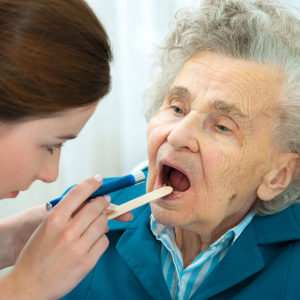
Today’s article is written by guest blogger Kathy Tuckey, MA. Kathy is a PAC Certified Independent Trainer who writes and speaks regularly on the subject of caring for elderly loved ones with dementia. This article originally appeared in the July 2019 edition of the Online Dementia Journal, a publication produced by dementia educator Teepa Snow.
The nurse said, “Good morning, I will be taking your blood pressure first.” “No!” Betty said. “You are not!”
“It will only take a minute.” the nurse said. “No!” Betty repeated. “You will not.”
“Betty,” I said. “She only wants to take your blood pressure.”
“No!” Betty, looking at the nurse, repeated more sternly. “You will not.” “I will come back in a minute.” the nurse said.
After she left the room, I said, “Betty, why won’t you let her take your blood pressure?”
Betty said. “What if she doesn’t give it back?”
The year was 1996 and this was the first medical appointment that Betty, my mother-in- law, had with a new primary care physician after she had come to live with my husband and me. It was about two years after Betty’s Alzheimer’s diagnosis. In that moment, I knew communication was taking on a whole new language and I was going to have to learn it. What an eye opener, and if only I knew then what I know now. I call this LBT or Life Before Teepa and thankfully there was LAT or Life After Teepa. I do look back at Betty’s interaction with the nurse and I chuckle – “way to go Betty – in one encounter you taught your nurse and me to focus on you and not the task at hand!”
Today there are many resources on the web where you will find tips and strategies to help navigate the medical appointment maze. I had to become the expert navigator and advocator for Betty, and you must become yours. Today, I draw upon my life with Betty, what I learned from Teepa, my professional experience teaming with staff in assisted living communities, working with a national association, and currently with an amazing neurology group in a medical center.
Ask yourself – what time of the day is best for the person living with dementia? If I am the person living with a dementia, what is best for me? In Betty’s case, early afternoon was best. It was not the best time for Thom or me because of work, but we learned quickly what was best for Betty would be best for all. This cannot always happen, as with emergent appointments but I was prepared for those – brought a snack and bottle of water for both of us!
I cannot emphasize enough to come with written questions. And do bring a pen! Put those questions in priority order. And, before you leave the appointment, look at the list and see if your priority questions have been answered. A major challenge I see in medical appointments is when the care partner and/or patient is asked by the doctor “Do you have any questions?” and they have no response. Of course, they leave the appointment and kick themselves later for not asking what they should have.
It is recommended that you get a calendar/notebook just to keep notes of changes that occur between appointments. It would be great to write a synopsis of the calendar/notebook and share it with the nurse so that the clinician has time to review before they enter the room. If your loved one is residing in a community, be sure you have notes from the staff.
Take notes at the appointment. This might be challenging for some of us to do since it distracts us from listening – maybe have another family member or friend take notes.
Try using reflective listening with the provider – “so what I hear you saying…” This helps any misunderstanding. Stop the physician/clinician if they are using words you don’t understand. Ask them to clarify and explain. In this way you become the advocate for the patient and care partner.
If you are seeing any sudden changes make an appointment with the primary care physician. Don’t wait!
What if you have concerns about the appointment? Address them with the staff/office manager. The medical staff is now part of your team. Yes, you can change physicians and find another provider. But, don’t rush to change. Many times, the concerns can be addressed and resolved. Taking a few deep breaths does help!
With limited appointment time, we must make the most of the time we have. I still live the Girl Scout motto – Be Prepared. Because of Teepa and Positive Approach® I am now better prepared to be the advocate for others as they navigate the medical experience and so can you!
Kathy is a Positive Approach® to Care Certified Independent Trainer, Mentor, and Speaker and the Patient Educator/Outreach Coordinator for the Medical College of Georgia at Augusta University Department of Neurology – Movement and Memory Disorder Programs. She earned her BA and MA from Montclair State University (formerly Montclair State College) in New Jersey.
Kathy has held leadership roles in the assisted living industry as both an executive director and resident relations director. She served as the Program Director for the Alzheimer’s Association Georgia Chapter (Augusta) for over eight years. Kathy has over 25 years of experience in the area of gerontology and has also provided care to a variety of personal friends and family members living with various dementias.


